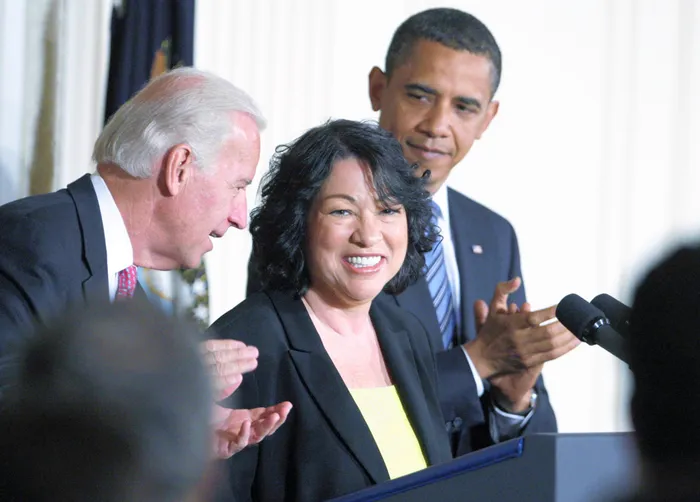Biden and Congress must act to restore affirmative action

Picture: Jim Young/REUTERS/Taken on May 26, 2009 – From left, former vice president Joe Biden (now president) speaks to Judge Sonia Sotomayor as she steps up to speak after then US President Barack Obama announced her as his choice of nomination for the Supreme Court justice. The Supreme Court recently has taken a decision to strike down race-based admissions at Harvard and the University of North Carolina. The writer says Sotomayor’s dissenting words resonate deeply: ‘Ignoring race will not equalise a racially unequal society. What was true in the 1860s, and again in 1954, is true today: Equality requires acknowledgement of inequality.’
By Ronnette A Cox
The recent Supreme Court decision to strike down race-based admissions at Harvard and the University of North Carolina is a concerning setback for equal opportunity and social progress. As an African American who has personally experienced the transformative power of education, I am outraged.
Education has long served as a catalyst for upward mobility and wealth building, and eliminating race-conscious admissions policies threatens to hinder the growth of future generations. We must take action to ensure marginalised communities, particularly African Americans, maintain access to the educational opportunities they need to thrive.
Representation matters. As a former community organiser and staff member at The Centre for Popular Democracy (CPD), I understand the broader implications of this decision. I recall my own profound experience at the Harvard Business School’s Summer Ventures in Management Programme (SVMP), where I met fellow students who, like me, had never imagined attending an Ivy League institution. The programme’s affirmative action initiative ensured that talented individuals from diverse backgrounds were introduced to essential business principles, alternative learning models, and a supportive network, providing them with the chance to excel and succeed.
This Supreme Court ruling places the SVMP and similar initiatives in jeopardy, undermining the progress made in fostering diversity and inclusivity in higher education. These programmes offer hope and inspiration to marginalised communities, demonstrating that they too belong in spaces historically reserved for the privileged few.
The recent Supreme Court decision to strike down race-based admissions poses a significant threat to the progress we have made in building a more inclusive society.
Supreme Court Justice Sonia Sotomayor’s dissenting words resonate deeply: “Ignoring race will not equalise a racially unequal society. What was true in the 1860s, and again in 1954, is true today: Equality requires acknowledgement of inequality.” Affirmative action policies have been vital in addressing historical disparities and promoting diversity on campuses and in corporate America. By recognising the unique challenges faced by underrepresented groups, these policies strive to level the playing field and create a more inclusive society. The Supreme Court’s decision threatens to reverse decades of progress, perpetuating the same systemic barriers that affirmative action seeks to dismantle.
To protect and reinforce the principles of equal opportunity, it is imperative that we call upon the Biden Administration and Congress to correct this injustice and reaffirm their commitment to affirmative action. They must champion legislation that safeguards the ability of educational institutions to consider race as a factor in admissions, thereby ensuring that diversity remains a cornerstone of our educational system. Additionally, Congress holds the power to advance fairness and inclusivity within the judiciary by passing the Judiciary Act of 2023, which would enable the expansion of the courts and promote equitable representation.
In addition to advocating for policy changes, it is crucial to support organisations like the Thurgood Marshall College Fund. This fund plays a vital role in providing scholarships and resources to students from historically Black colleges and universities, creating pathways for deserving students to access the opportunities they rightly deserve, regardless of their backgrounds.
Education stands as a potent force for change, social mobility, and breaking the cycle of inequality. The recent Supreme Court decision to strike down race-based admissions poses a significant threat to the progress we have made in building a more inclusive society. Let us wholeheartedly embrace the wisdom of Justice Sotomayor, who reminds us that “equality requires acknowledgement of inequality”.
It is our collective responsibility to unite, raise our voices, and demand that our elected officials rectify this injustice. Affirmative action is not a handout, but a necessary means to ensure equal access to educational opportunities for all. By persistently advocating for a future where every individual, regardless of race or background, has the chance to thrive, succeed, and contribute, we can forge a more equitable world for generations to come.
Ronnette A Cox is the Web and CRM Specialist at The Centre for Popular Democracy.
This article was published on Common Dreams